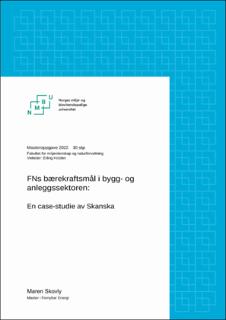| dc.contributor.advisor | Holden, Erling | |
| dc.contributor.author | Skovly, Maren | |
| dc.date.accessioned | 2022-08-23T10:34:56Z | |
| dc.date.available | 2022-08-23T10:34:56Z | |
| dc.date.issued | 2022 | |
| dc.identifier.uri | https://hdl.handle.net/11250/3013054 | |
| dc.description.abstract | FNs bærekraftsmål ble vedtatt gjennom Agenda 2030 på FNs generalforsamling i 2015 og inneholder ambisiøse mål for verdens utvikling frem mot 2030. Bygg- og anleggssektoren har en viktig rolle i det grønne skiftet og stort potensial for å bidra til oppnåelsen av FNs bærekraftsmål. Det er likevel begrenset akademisk litteratur som undersøker hvordan sektoren kan bidra til målene satt i Agenda 2030. Derfor er det behov for dypere forståelse av hvordan FNs bærekraftsmål brukes og hvordan de påvirker daglige arbeidsoppgavene hos de ansatte. For å bidra til forskningen om hvordan bransjen kan oppnå en effektiv implementering av bærekraftsmålene undersøker denne oppgaven følgende problemstilling: I hvilken grad påvirker FNs bærekraftsmål arbeidshverdagen til de ansatte i Skanska, og hvordan motiveres de ansatte av bærekraftsmålene?
Problemstillingen belyses ved bruk av kvalitativ metode. Datainnsamlingen er gjort gjennom semistrukturerte intervjuer med ansatte i Skanska, som jobber i et byggeprosjekt i Oslo-regionen. Utvalget i denne oppgaven består av fem respondenter. En seks-trinns tematisk analyse etter rammeverket til Braun og Clarke (2016) er brukt for å kode og tematisere innholdet i datamaterialet.
Analysen resulterte i fem funn som belyser problemstillingen. For det første beskrives bærekraft og FNs bærekraftsmål som uklare begreper som foreløpig ikke har tilstrekkelig forankring blant de ansatte. For det andre virker det som at assosiasjoner til bærekraft samsvarer best med den lokale miljødimensjonen, mens det globale fokuset i stor grad holdes utenfor arbeidsoppgavene. For det tredje fremstår det økonomiske handlingsrommet i prosjektet som en barriere for å teste ut nye miljøvennlige løsninger. Bærekraft og utslippskutt er bestemte målsetninger som er forankret i organisasjonen, men det oppleves ikke som en motivasjon i seg selv. For det fjerde oppleves det som utfordrende å motiveres av konsepter og miljøsertifiseringer som man ikke helt forstår hensikten med. Avslutningsvis er det avgjørende med synlige resultater for å finne motivasjon i FNs bærekraftsmål. Det vil være viktig å bryte ned bærekraftsmålene i spesifikke delmål for å kunne se resultater av arbeidet som legges ned i prosjektet.
Denne oppgaven tar utgangspunkt i en case-studie av Skanska og funnene representerer et øyeblikksbilde av den aktuelle situasjonen som undersøkes. Det understrekes at utvalget ikke anses som representativt for alle ansatte i Skanska. | en_US |
| dc.description.abstract | The UN's sustainability goals were adopted through Agenda 2030 at the UN General Assembly in 2015 and contain ambitious goals for world development towards 2030. The construction sector plays an important role in the “green shift” and holds great potential to contribute to the achievement of the UN's sustainability goals. There is limited academic literature examining how the sector can contribute to Agenda 2030. This highlights the need for a deeper understanding of how the UN's sustainability goals affect and are used in daily work tasks in the construction industry. To contribute to the research on how the industry can achieve an effective implementation of the sustainability goals, this thesis examines the following issue: To what extent does the UN's sustainability goals affect the everyday work of Skanska's employees, and how are employees motivated by the sustainability goals?
The problem is addressed using a qualitative method. The data collection is done via semistructured interviews with employees of Skanska who work directly in a construction project in the Oslo-region. The sample in this paper was limited to five respondents. A six-step thematic analysis according to the framework of Braun and Clarke (2016) is used to code and thematize the content of the data material.
The analysis resulted in five key findings that shed light on the problem. Firstly, employees feel that sustainability and the UN's sustainability goals are confusing concepts that lack anchoring among the workers. Secondly, it seems that associations with sustainability is most closely linked with the local environmental dimension, but the global focus is largely kept out of the work tasks. Thirdly, sustainability and emission reductions appear as specific objectives that are rooted in the organization, but it is not perceived as a motivation. Finances appear to be a limiting factor for the exercise of sustainability in the project. Fourth, it is perceived as challenging to be motivated by concepts and environmental certifications that one does not fully understand the purpose of. Finally, visible results are crucial to finding motivation in the UN's sustainability goals. This deals with the importance of breaking down the sustainability goals into specific sub-goals in order to be able to see the results of the work that is put into the project.
This thesis is based on a case study by Skanska and the findings represent a snapshot of the current situation being investigated. It is important to bear in mind that the sample is not considered representative of all Skanska employees. | en_US |
| dc.language.iso | nob | en_US |
| dc.publisher | Norwegian University of Life Sciences, Ås | en_US |
| dc.rights | Attribution-NonCommercial-NoDerivatives 4.0 Internasjonal | * |
| dc.rights.uri | http://creativecommons.org/licenses/by-nc-nd/4.0/deed.no | * |
| dc.title | FNs bærekraftsmål i bygg- og anleggssektoren : en case-studie av Skanska | en_US |
| dc.title.alternative | UN sustainable development goals in the construction sector : a case study of Skanska | en_US |
| dc.type | Master thesis | en_US |
| dc.description.localcode | M-FORNY | en_US |

